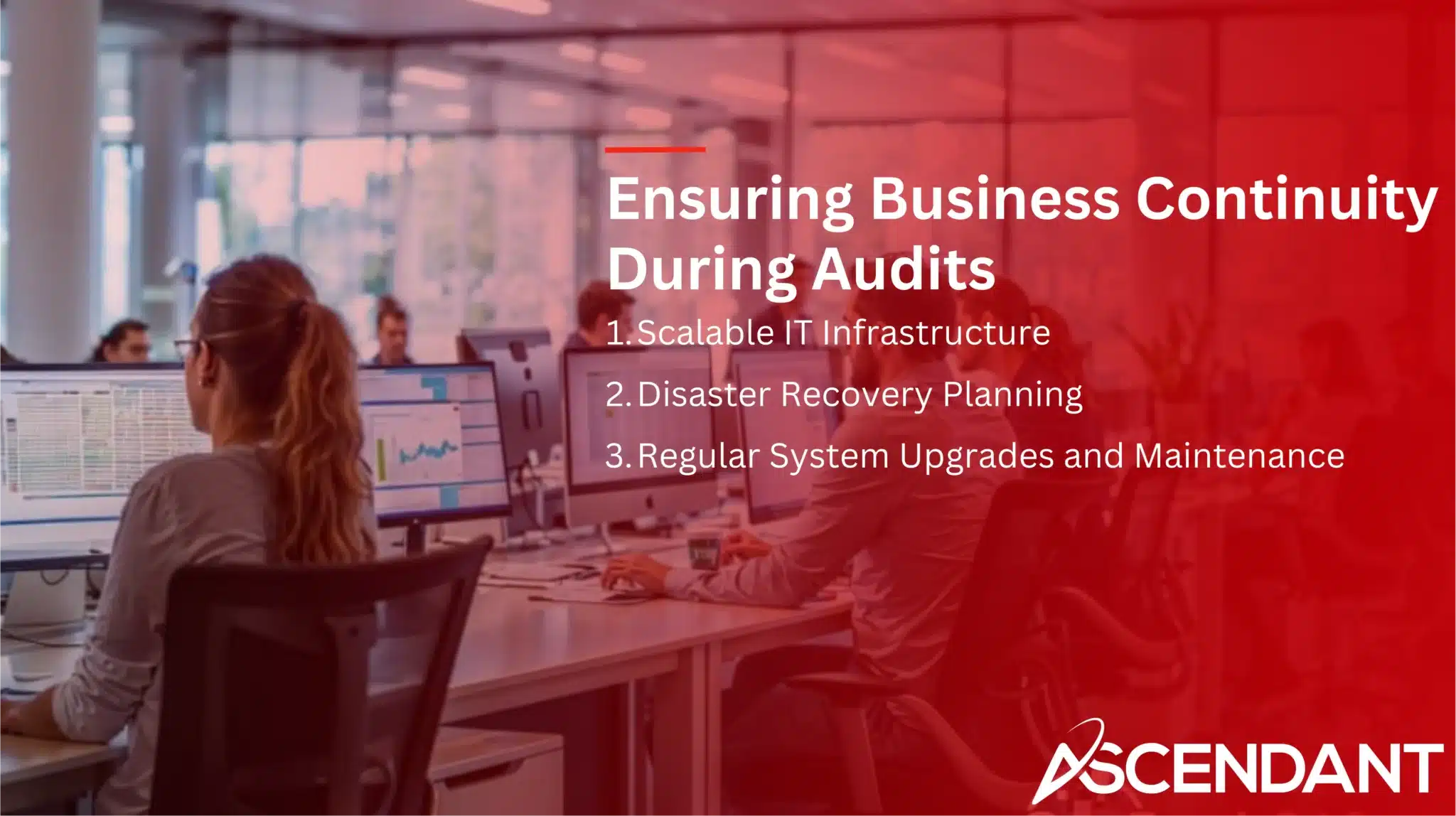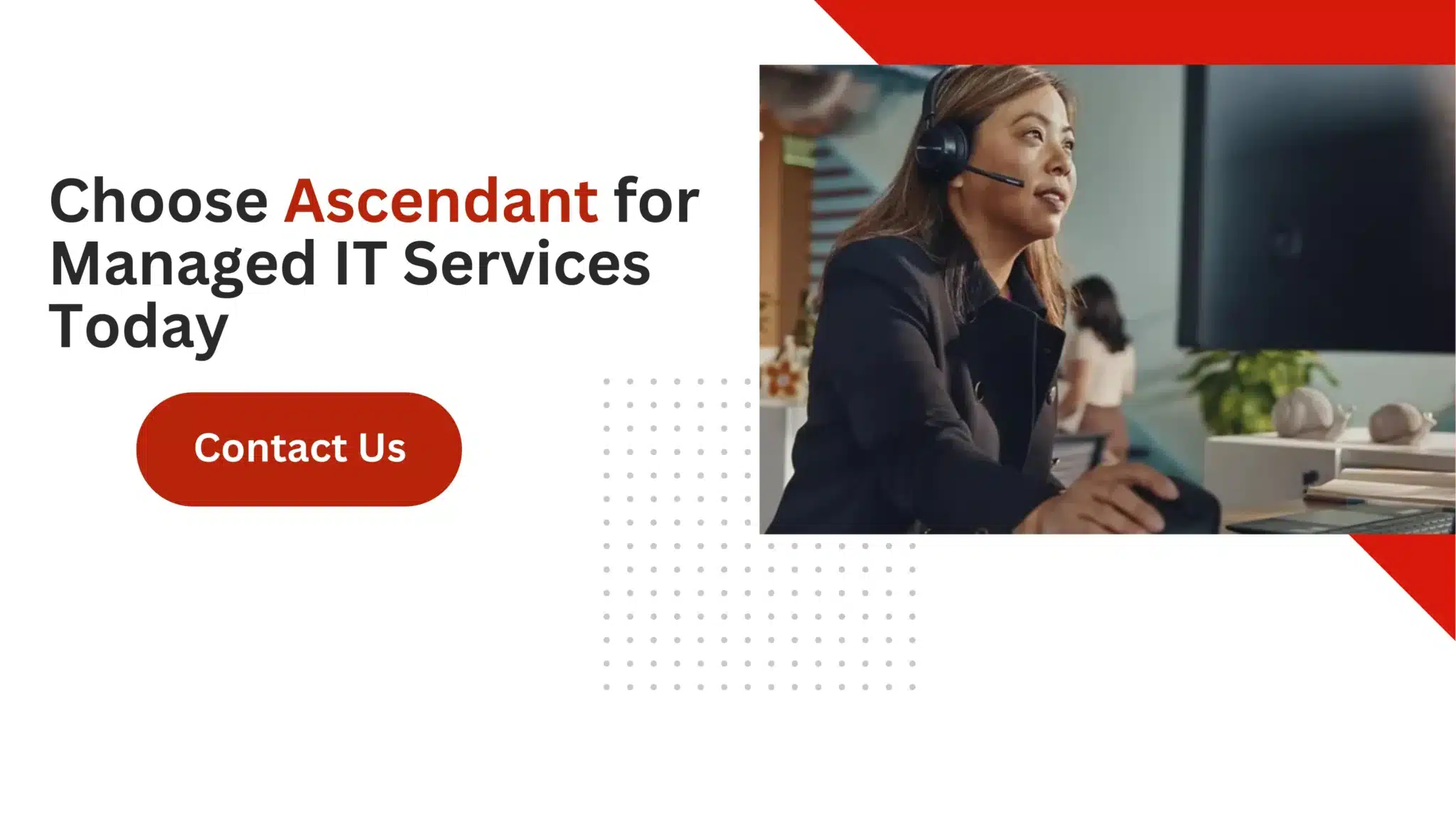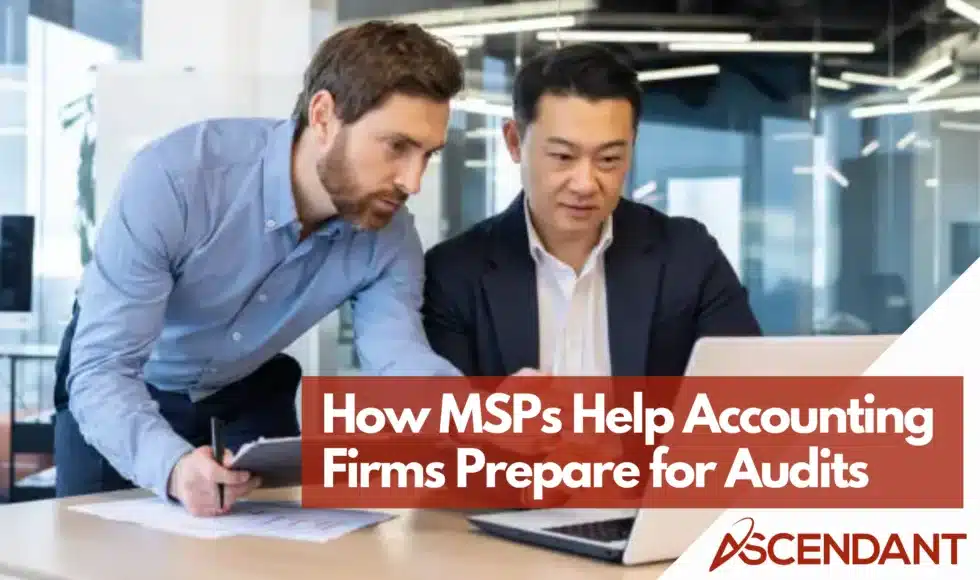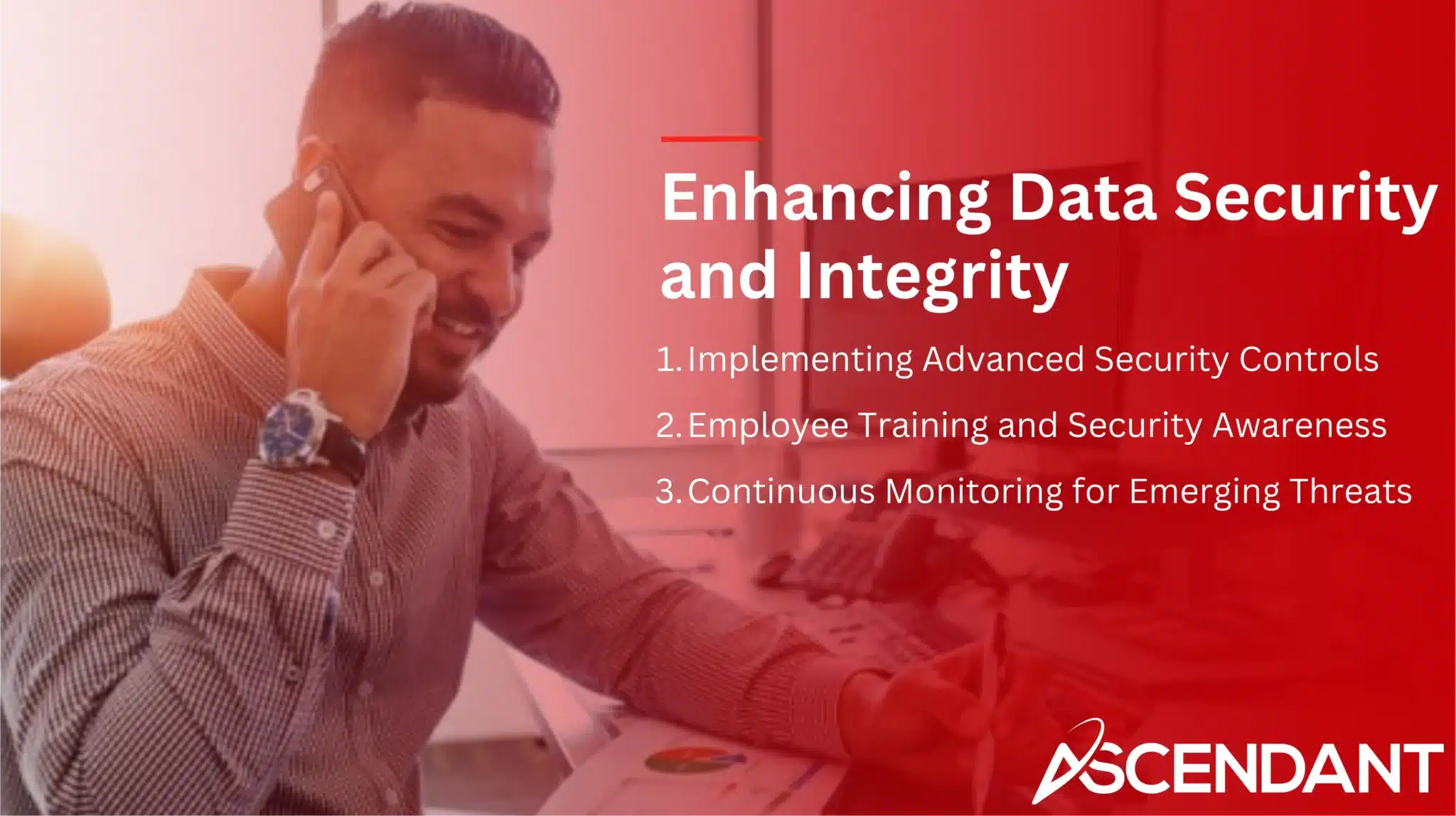Preparing for audits can be challenging for accounting firms. Managed Service Providers (MSPs) offer vital help in this process. In this article, we explain how MSPs help accounting firms prepare for audits by securing data, ensuring compliance, and providing essential technical support.
In This Article:
- The Role of Managed IT Service Providers in Audit Preparation
- Enhancing Data Security and Integrity
- Leveraging Technology for Efficient Audits
- Ensuring Business Continuity During Audits
- Building Trust and Transparency with Clients
Key Takeaways
- Managed Service Providers (MSPs) enhance audit preparation for accounting firms through cybersecurity support, proactive data management, and compliance assistance.
- MSPs implement advanced security measures and regular training to safeguard sensitive financial data, ensuring ongoing compliance with regulatory standards.
- Leveraging technology, including cloud-based solutions and automation, allows MSPs to improve operational efficiency and provide valuable insights during the audit process.
The Role of Managed Service Providers in Audit Preparation
Managed service providers play a pivotal role in facilitating the readiness of accounting firms for audits. By optimizing the audit journey, these providers enhance an organization’s ability to accomplish audits with finesse. They contribute expertise and support that bolster cybersecurity measures, securing systems in line with compliance standards. Through their forward-thinking approaches to risk management and adherence strategies, managed service providers for accounting firms help confront auditing challenges head-on while aligning with necessary regulatory frameworks.
Through vigilant data stewardship practices crucial for upholding data veracity during audits, MSPs conduct consistent system refinements and upkeep. These actions confirm that technological resources remain effective and meet business requirements adequately. By proactively identifying weaknesses within systems ahead of time, managed service providers not only reduce potential hiccups throughout the audit trail, but also affirm msp compliance fidelity.
Beyond offering technical assistance. Managed service providers act as invaluable allies committed to enabling a seamless and triumphant outcome for every audit engagement.
Proactive Monitoring and Risk Assessments
By engaging in proactive monitoring, Managed Service Providers (MSPs) are able to identify and address potential disruptions like system outages before they interfere with the auditing process. This involves consistent testing of disaster recovery procedures to confirm that staff can effectively tackle emergencies when they arise. Regular updates and maintenance performed by MSPs play a vital role in ensuring that technology stays current and meets operational demands, which is key for risk reduction and preserving business operations throughout audits.
Continuous monitoring plays an indispensable role in recognizing vulnerabilities early on and staying one step ahead of new threats. Through strategic planning, MSPs frequently carry out risk assessments to manage compliance effectively and maintain ongoing adherence to regulatory requirements. Adopting this forward-looking strategy not only improves the security stance of accounting firms, but also builds deeper trust with clients by showcasing a strong commitment to upholding security standards and compliance regulations.
Data Backup and Recovery Services
It is crucial for accounting firms to invest in strong data backup solutions to protect client data throughout the audit process. Managed Service Providers (MSPs) offer vital backup services and IT support, which play a significant role in safeguarding sensitive client information against cyber threats including data breaches. MSPs provide cybersecurity measures specifically designed to meet the distinctive challenges that accounting firms encounter, guaranteeing both security of the data and its accessibility during audits.
Having an effective disaster recovery strategy is another key aspect offered by MSPs. These strategies are comprehensive, encompassing well-defined responsibilities, communication protocols, and set targets for restoration times, all aimed at ensuring prompt reinstatement after any operational disruptions.
Regular updates and maintenance of IT systems are imperative in maintaining their security and effectiveness. This practice contributes significantly to the reliability of operations amidst auditing activities. For keeping client information accessible while also supporting uninterrupted business functioning during audit periods, reliance on thorough data backup and recovery services provided by MSPs is indispensable.
Compliance Management and Support
Managed Service Providers (MSPs) offer continuous compliance support to accounting firms, helping them adhere to and stay current with regulatory standards. They provide specialized advice on evolving data security laws, implement protective strategies, and conduct periodic reviews. MSPs’ proactive approach includes sophisticated security protocols that aid in meeting the stringent demands of financial regulation, giving accounting firms assurance throughout their auditing activities.
For accounting firms to reliably meet these regulatory benchmarks, a strong IT infrastructure is crucial. MSPs play an integral role in establishing and upholding this structure while preparing organizations for any future obstacles related to compliance. Beyond satisfying regulations, such comprehensive ongoing assistance from MSPs also reinforces client confidence by showcasing a steadfast commitment to maintaining both security and compliance norms.
Enhancing Data Security and Integrity
Ensuring the security of financial data and the integrity of processing is essential for achieving positive outcomes in audits within accounting firms. In this regard, managed service providers (MSPs) are instrumental by conducting gap analyses to uncover any weaknesses in security before an audit takes place. By detecting system issues or cybersecurity threats promptly, MSPs help reduce disruptions and prepare accounting firms effectively for upcoming audits.
MSPs play a pivotal role in helping these firms comply with pertinent regulations, thus reducing the risks associated with cybersecurity audits. They proactively seek out and rectify vulnerabilities to bolster the firm’s defenses against breaches that could compromise sensitive financial information. These actions are critical not only for protecting financial data, but also for ensuring adherence to regulatory demands.
Implementing Advanced Security Controls
It is essential to employ advanced security measures to ensure the protection of sensitive financial data and other confidential client information from potential breaches. MSPs utilize encryption as a fundamental control mechanism, securing their clients’ details effectively. Continuous refinement and enhancement of these protective strategies underscore an organization’s dedication to maintaining the safety of client data in compliance with PCI DSS requirements.
A firm’s commitment to stringent security protocols not only bolsters its reputation, but also solidifies the trust that clients place in it regarding the security of their financial records. Such sophisticated controls, both internal and external, play a pivotal role in fulfilling regulatory obligations and safeguarding the integrity of financial information when undergoing audits—neglecting this can have severe consequences for a company’s standing within its industry.
Employee Training and Security Awareness
Enhancing security awareness through consistent employee training is essential for accounting firms. It is important that staff are trained in compliance and best security practices to efficiently identify potential cybersecurity threats. Cultivating a strong culture of security within an accounting firm substantially improves its defense against cyber risks.
By maintaining regular training programs, employees within these firms remain informed about the latest cybersecurity hazards and appropriate countermeasures. Such continuous education is vital to ensure adherence to regulatory standards with a robust cybersecurity compliance program, thereby protecting sensitive financial data effectively.
Continuous Monitoring for Emerging Threats
Continuous monitoring facilitates real-time detection and reaction to cyber threats, substantially minimizing the associated risks. It is imperative for accounting firms to engage in persistent surveillance of their systems so as to pinpoint any security infringements promptly before they develop into grave complications. By embracing strategies centered on continuous monitoring, these firms not only bolster their defensive stance but also deepen the confidence that clients place in them.
For accounting firms seeking to maintain a competitive edge against evolving cyber dangers, employing continuous monitoring is indispensable. This forward-thinking method aids in risk reduction and guarantees constant adherence to regulatory requirements, thereby reinforcing both the firm’s ongoing compliance efforts and its overall safeguarding measures.
Leveraging Technology for Efficient Audits
The introduction of cloud-based accounting software is revolutionizing the financial processes managed by MSPs. The addition of AI and data analytics into this mix is amplifying these changes even further. These cutting-edge technologies are elevating efficiency, offering scalability options, and providing immediate insights, thereby refining accounting procedures while also ensuring adherence to regulatory requirements. It’s essential for MSPs to keep abreast of these emerging technologies in order to bolster their services and maintain a competitive edge within the accounting sector.
During critical times such as tax season, proficient IT professionals become key in adjusting network bandwidth, storage capacity, and processing power to meet increased demands. By harnessing these technological solutions, MSPs can enhance operational fluidity and accuracy while delivering analytical insights that contribute to growth and heightened profitability for clients within the realm of accounting firms.
Specialized Accounting Software
Cloud-based accounting software allows accounting firms to access data anytime, enhances collaboration, and ensures data security. When selecting accounting software, MSPs should consider factors such as scalability, user-friendliness, data security measures, and integration capabilities. Robust accounting software should include features like invoicing, expense tracking, financial reporting, and integration with other systems.
Specialized accounting software enhances operational efficiency and accuracy for accounting firms, leveraging specialized expertise. MSP-specific software can streamline invoice management, making it easier to track client payments and manage financial transactions effectively.
Automating Routine Tasks
By implementing an automated billing process, accounting firms can mitigate the risks of revenue loss and enhance their financial management. Automating key aspects of accounting leads to time savings, diminished error rates, heightened productivity, and better precision in financial matters. This shift towards automation allows for a reallocation of focus from mundane tasks to strategic actions that promote the growth of the business.
The tendency for substantial mistakes due to manual data entry underscores the importance of embracing automation within these practices. With automated data entry achieving accuracy levels between 99.959% and 99.99%, it dramatically lowers the likelihood of errors occurring.
By automating repetitive procedures involved in payment audits, not only is human error significantly minimized, but also cash flow becomes more efficient. Solidifying this technological advancement is essential within modern accounting firm operations.
Providing Valuable Insights Through Data Analytics
An examination of an MSP’s financial records yields essential data that is imperative for formulating budgets and assigning resources optimally, thus improving the ability to serve clientele more efficiently. Accounting within managed service providers (MSPs) is fundamental in making informed decisions that propel expansion and elevate profits. Through the integration of data analytics, MSPs provide critical perspectives that bolster accounting firms’ strategic planning initiatives.
The use of artificial intelligence to scrutinize financial information reveals trends which facilitate enhanced decision-making processes for MSPs. These significant revelations assist accounting firms in pinpointing deficiencies, refining their approach to financial management, and maintaining adherence to regulatory requirements.
Ensuring Business Continuity During Audits
Managed service providers (MSPs) employ thorough approaches to enhance business resilience, emphasizing the importance of risk assessments and customized disaster recovery schemes. These MSPs craft specific strategies to identify weak spots and create disaster recovery plans that ensure ongoing operations persist seamlessly during auditing processes. For MSPs, automation plays a vital role in boosting operational effectiveness and providing uniform services.
To guarantee uninterrupted business activity, MSPs assist accounting firms in managing audit procedures with minimal disturbance. Such tactics are essential for preserving data security, adhering to regulatory standards, and ensuring the triumphant outcome of audits.
 Scalable IT Infrastructure
Scalable IT Infrastructure
Adjustable IT infrastructure is pivotal for accounting firms, as it empowers them to dynamically scale resources to maintain optimal performance during crucial times like audit seasons. The ability to swiftly modify IT capabilities in response to immediate needs makes this flexibility invaluable when facing the intensified requirements of an audit.
Managed Service Providers (MSPs) utilize scalable IT frameworks, guaranteeing that accounting firms are equipped with adequate resources to manage the surge in workload brought on by audits. This level of elasticity is fundamental in preserving operational effectiveness and securing a triumphant result from auditing endeavors.
Disaster Recovery Planning
Ensuring the protection of client information, compliance with data security regulations, and business continuity are critical components of disaster recovery planning. An audit directed at a cloud service provider scrutinizes various aspects such as data security measures, access management, incident response capabilities, and strategies for business continuity to ensure robust defense against unforeseen disruptions.
To facilitate smooth continuation of operations during an unexpected interruption or failure, effective disaster recovery plans must encompass comprehensive methods for backing up data along with clear allocation of roles and communication procedures aimed at expediting restoration processes. These meticulously crafted plans play an indispensable role in reinforcing data security defenses against potential losses while satisfying requirements during compliance audits.
Regular System Upgrades and Maintenance
Continual updates to systems and software are essential for sustaining robust computational capabilities and enhancing the general performance of the system. Ensuring technology remains current is crucial in reducing the risks associated with obsolete systems, particularly those concerning security weaknesses. Proactive identification and resolution of problems can be achieved by instituting routine maintenance routines.
Utilizing automated updates for systems aids in decreasing downtime while keeping software up-to-date with necessary security enhancements. Performing systematic audits on these systems improves maintenance efficiency and assures adherence to relevant industry benchmarks. Consistent upkeep extends not only the lifespan of technological assets, but also brings about several advantages such as elevated productivity levels and increased customer satisfaction.
Building Trust and Transparency with Clients
Managed service providers bolster the trust of their clients by embracing stringent financial practices and showcasing a dedication to security and compliance measures. By deploying an effective communication strategy, they maintain transparency with all involved parties throughout the auditing process. This not only avoids miscommunication, but also strengthens bonds through managed IT services, underscoring the vital role played by the service provider in fostering this trust.
Focusing on clear financial dealings, open lines of client communication, and unwavering adherence to security standards and regulatory compliances enables MSPs to nurture lasting trust from clients while preserving strong partnerships. Such commitments are fundamental for assuring enduring prosperity and expansion for accounting firms that rely on these managed services.
Financial Transparency and Reporting
Maintaining financial transparency is essential for MSPs as it fosters confidence among clients and stakeholders. The principles of revenue recognition in MSP accounting encompass the appropriate timing of recognizing revenue, distinguishing distinct performance obligations, and assigning revenue to each respective financial obligation. Consistent reporting on financial management offers a view into the fiscal well-being of an organization, highlights areas needing enhancement, and guides strategic choices.
In the process of recognizing revenues for MSPs, it’s imperative to evaluate whether revenues are collectable with certainty while upholding exactness and openness within all financial transactions. By persisting in transparent finances and routinely disclosing detailed reports, MSPs affirm their dedication to reputable monetary practices.
Such forthrightness not only cultivates reliance from clientele but also equips accounting firms with reliable data crucial for making informed judgments. Implementing steadfast procedures regarding comprehensive fiscal reporting plays a critical role in preserving economic integrity as well as facilitating triumphant results during audits.
Client Communication and Engagement
Maintaining an open and effective dialogue with clients during audits is crucial for avoiding misinterpretations and fortifying mutual trust. By adopting successful communication tactics, the strength of client bonds is enhanced over the course of the audit process. Ensuring that clients receive transparent and regular updates allows them to stay knowledgeable about auditing procedures, any emerging concerns, and how these issues are being handled.
Consistently interacting with clients in an honest manner bolsters their belief in the firm’s capacity to adeptly oversee the audit process. A forward-thinking stance on keeping lines of communication open showcases a dedication to fulfilling client needs and plays a vital role in sustaining enduring connections with them.
Demonstrating Commitment to Security and Compliance
Enlisting Managed Service Providers (MSPs) to conduct payment audits introduces an element of impartiality and MSP-centric proficiency, underlining the firm’s adherence to security protocols. For accounting firms, a demonstrated dedication to security and compliance is crucial in enhancing their standing and fostering trust among clients. A robust commitment to these principles assures clients that their financial information is handled with utmost care regarding both secure management and adherence to regulatory standards.
This unwavering focus on meeting security and compliance mandates not only fortifies bonds with clients but also boosts the firm’s reputation within the sector. When accounting firms prioritize these aspects, it signals their resolve in protecting client information and achieving successful audit results.
 Summary
Summary
In summary, managed service providers are instrumental in equipping accounting firms for the demands of auditing. By implementing strategies such as proactive monitoring, ensuring reliable data backup and recovery solutions, and managing compliance intricately, MSPs facilitate a seamless and victorious navigation through the audit process. Their role is crucial in bolstering data security measures, optimizing technology to streamline audits effectively, and maintaining operational continuity essential for these firms.
Instilling client confidence is achieved by fostering financial transparency, engaging in effective dialogue with clients while upholding stringent standards for security and compliance—key factors that reinforce the significance of MSPs during audit preparation. In embracing these practices diligently, accounting firms not only secure favorable results from their audits but also amplify their prestige within the industry and nurture enduring trust with their clientele.
Frequently Asked Questions
How do managed service providers assist accounting firms in preparing for audits?
Managed service providers enhance the audit readiness of accounting firms by providing proactive monitoring, data backup and recovery services, and compliance management.
This support ensures a smooth and successful audit process.
What role does data security play in the audit preparation process?
In the process of preparing for an audit, it is vital to prioritize data security in order to protect sensitive information and adhere to regulatory requirements. Ensuring that strong security protocols are in place and providing proper training for staff members can lead organizations towards achieving positive results from their audits.
How does leveraging technology improve the efficiency of audits?
Utilizing advanced technology greatly improves the efficiency of audits by simplifying processes, reducing mistakes, and providing instant insights via resources such as cloud-based accounting software and data analytics.
Such technological advancements result in audits that are both more efficient and prompt.
Why is regular system maintenance important during the audit process?
Regular system maintenance is essential during the audit process as it ensures effective computing power, reduces risks from outdated systems, and supports compliance with industry standards.
This proactive approach fosters a reliable and secure environment for audits.
How can accounting firms build trust and transparency with their clients during audits?
Accounting firms build trust and transparency with clients during audits by ensuring financial transparency, employing effective communication strategies, and demonstrating a strong commitment to security and compliance.
These practices foster a reliable and open relationship with clients.


